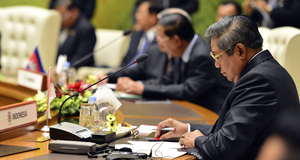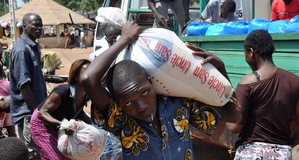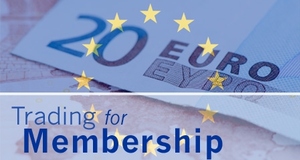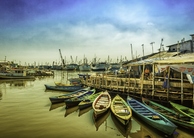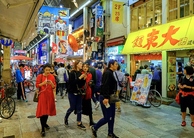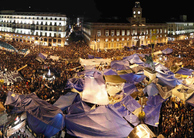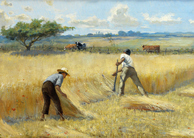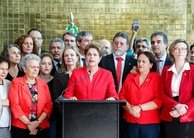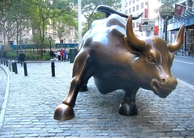From Clocks and Clouds VOL. 2 NO. 1Karl Marx and the Fair Trade Chocolate Industry in the Ivory Coast
By
Clocks and Clouds 2012, Vol. 2 No. 1 | pg. 1/1
IN THIS ARTICLE
KEYWORDS
AbstractThe research completed aimed to show that the idea of fair trade, using the example of goals for the chocolate industry of the Ivory Coast, can be described as an example of the economic ideal which Karl Marx imagined. By comparing specific topics discussed by Karl Marx's philosophy on capitalism and its failures, and the ideals purported by fair trade organizations and partners, parallels can be made. This analysis showed that Karl Marx's philosophy coordinates with fair trade ideals in topics such as the importance of history, the eradication of child labor and environmental degradation, and community involvement. However, the theories differ slightly on the topic of self-sufficiency. This study shows the current importance of Marx's theories and that his philosophy is far from being determined irrelevant, even in the current modern and capitalistic world. Furthermore, in light of recent criticisms of globalization due to current economic and financial turmoil worldwide, the idea of fair trade and its correlations with Marxist philosophy is becoming even more relevant. Introduction and MethodologyKarl Marx is one of the greatest thinkers of all time, and many argue that his philosophy still has a place in today's world. One area where his thoughts remain relevant is in the discourse over free trade vs. fair trade. Fair trade attempts to address issues inherent in capitalism and globalization, something which is being increasingly mentioned in light of recent events. This paper will be an exploratory literature review discussing Karl Marx's critique of capitalism and writings about fair trade goals. Because "Marxism" today has metamorphosed from Marx's original theories, the research completed will ground itself in the basic philosophical ideas of Karl Marx. The assumption in doing this study is that fair trade goals are valid and that their policies are working. This paper attempts to remain somewhat removed from the politics of fair trade and of whether it has been successful, although these points are important and will be mentioned briefly. This paper will investigate whether the current campaign for fair trade in the chocolate industry of the Ivory Coast has the potential to be an example of Karl Marx's hope for capitalism. Defining Terms and IdeasFundamentally, free trade is focused on the modernization theory, in response to fair trade's claims which follow the dependency theory Free trade will be taken as a very simple definition of completely open trade according to David Ricardo's principle of comparative advantage and specialization. Free trade contains no trade barriers such as tariffs, quotas, and sanctions. Free trade also focuses on the evaluation of production through cost-benefit analysis, attempting to produce the most at the lowest cost. The fair trade theory is distantly based on Marxist principles, such as dependency and exploitation (Eisenberg 2005). Fair trade takes a step further than free trade in enabling production and helping members in the fair trade network "survive and compete on the international market" (Fridell 2006, 11). This is the most important goal, even if it disables comparative advantage or the ability to achieve the lowest cost possible in production. Fair trade's main goal is to increase partnership, dialogue, transparency and respect while also searching for better trading conditions ("The chocolate industry" 2011). The Fairtrade Labeling Organization (FLO) is the larger organization of 25 other non-profits which label products "produced under the conditions of no child labor, environmental sustainability, strict labor standards and various regulations to ensure democratic participation in small-producer cooperatives and unionized plantations" (Fridell 2006, 10). The hope of fair trade initiatives is to create conditions for production which ensure protection of the laborer and tackles other evils of capitalist production. Marxism will be defined using its very basic principles such as "an economy which would be neither centrally planned nor market governed." According to this model, "decisions on the overall allocation of resources would be set by representative assemblies local, regional, and national" levels (Eagleton 2011, 25). It focuses more on the bottom-up approach in deciding how and what resources are allocated. Certain aspects of Marx's ideals have been chosen in order to develop a well-rounded description of Marx's critique of capitalism. Capitalism has given the world admirable concepts such as the middle class, liberty, democracy, civil rights, feminism, scientific progress, and many other things; however, Marx still finds room to grow His critique of capitalism includes the discussion of political impotence due to capitalism, the exploitation of the labor class, wealth inequalities, and other issues (Eagleton 2011). It is "the most searching, rigorous comprehensive critique of its kind ever to be launched," and will be translated into what Marx hoped for capitalism and the global economy, relating this hope to current fair trade debates (2). Four aspects have been chosen as a focus: Marx's explanation of the importance of history, importance of self-sufficiency, exploitation, and the development of and participation in community. These areas delve into key aspects of Marx's economic ideas and give an overall image of his critique of capitalism. It should be made clear that this is one author's view and application of Marx's theories and that most of the theories are titled and grouped through this author's interpretation. Some Existing Problems in the Chocolate IndustryThe issues of the how the chocolate industry functions and abuses worker rights, mainly in the phases of growing and trading cocoa beans are some which can be easily solved. Currently, middlemen take advantage of small farmers by offering to buy their crops below the actual value of the cocoa beans. Due to lack of communication and access to information, farmers take the price they are offered). Middlemen also use distorted scales in order to convince farmers that their crops weigh less getting more crops at the already low prices. These low prices may not even cover cost of inputs in production and basic family needs such as costly fertilizer and medicine. Fourteen million people in the developing world depend on cocoa production as their livelihood and in the Ivory Coast and Ghana 90% of people rely on cocoa for their primary income, showing how many people are possibly being taken advantage of. Around the world, 90% of cocoa is grown and harvested on small farms of 4.8 hectares owned by farmers who do not have access to more stable markets because small farms usually only produces .5 tons a year compared to the 10 tons required by major agricultural markets. Instead, this advantage is reaped by the owners of large plantations of 40 hectares or more who make up 5% of production ("Products: Cocoa" 2011). "Growers in West Africa are likely to receive just 3.5- 6.4% of the final value of a chocolate bar," compared to the 56-70% that the manufacturers receive and the 12-17% retailers receive (Goodyear 2011). Although the largest chocolate corporations are spread around the Western World, 70% of the world's cocoa beans are grown in West Africa, around 40% coming from the Ivory Coast alone Cocoa plantations in the Ivory Coast are one of the worst examples of issues in the cocoa industry. Although the working age is 18 in the Ivory Coast, there are still children working in the fields "wielding machetes, handling pesticides, and carrying heavy loads" (Parenti 2008). A number of these children are trafficked across borders, from Burkina Faso and Mali into the Ivory Coast (North 2011). The children, usually boys, between 11 and 16 years old, are bought by plantation owners and work up to 12 hours a day, receiving no salary or education. Girls are purchased to be housemaids, sometimes in addition to doing work on the plantation (Goodrich 2009). Besides doing dangerous work, these children are provided minimal food and shelter and sometimes beaten or threatened in order to make them stay (North 2011). It is presumed that 109,000 children are working in the Ivory Coast on cocoa farms, 10,000 who are victims of trafficking ("Cocoa Campaign" 2011). An estimated 800,000 children are believed to be working in the cocoa industry all over the world (Hawksley 2011). Poverty is the driving force behind child labor in this area. The traffickers rely on the "economic desperation" of the children from different areas and therefore promise a good job for them to make money for their families (North, 2011). In the areas of the plantations, more than 40% of the Ivory Coast's population lives under the poverty line (Hawksley 2011). This problem could be managed by enforcing labor laws and combined with ways to help the population of people involved in the issue avoid such extreme circumstances. Literature ReviewThere is a range of literature used to create an image of both Marx's philosophy and the goals of fair trade. In order to shape Marx's hope for capitalism, his original readings were used. Capital and The Communist Manifesto were read for basic knowledge. This offered the four topics which are used later to analyze fair trade goals. Other books which give basic explanations of Marx's principles and their effects are also used extensively. This group of literature offers basic economic explanations for his principles as well as an idealistic view of what Marx hoped his philosophy would accomplish and how it can still be used presently. In Terry Eagleton's Why Marx Was Right there is a foreboding nature, criticizing those who have come to view Marx as irrelevant or incorrect (Eagleton 2011). This gives an interesting perspective from which to understand perhaps what Marx truly desired, separating his theories from their later evolutions, such as Marxism or Leninism. In order to gain a better understanding of fair trade ideals, a basic history of fair trade and its groundings are explained in Gavin Fridell's article and through organization websites such as those of Fairtrade Labeling Organization, Equal Exchange, and others. Fridell's (2006) article explores the theoretical backing of the fair trade community, focusing on its neo-liberalist twist. Fair trade organization websites give information about their foundations and mission statements, as well as specific fair trade policies, goals, and their successes. Blog posts written by members associated with fair trade organizations or with a fair trade organization's website are also used to decipher the main goals and worries about the issues in the chocolate industry (Goodrich 2009). Organization briefs from certain conferences or pertaining to certain issues give more in-depth discussions about the plans for problems and policies being implemented. Raynolds and Wilkinson (2007) explain that fair trade is a movement which developed out of changing dynamics in the agrofood industry, "broader struggles over the regulation of global markets [and] the renegotiation of power," and increasing social movements which target the private sector rather than states. One important aspect they acknowledge is the increasing role of social movements which focus on industry and the market rather than state action, categorized as Global Social Justice initiatives. Global Social Justice initiatives aim to make change in labor in reference to social, cultural, and ecological rights (Raynolds & Wilkinson 2007). This piece offers greater background on fair trade and fits it into the broader changes in views of globalization. A study done by Bob Doherty and Sophi Tranchell (2005) seeks to analyze fair trade policies and their effects in a case study of a fair trade chocolate company in West Africa, the Day Chocolate Company. The study found that income and social premiums have increased from year to year in the case of the Kuapa members in the overall Day Chocolate Company. The Kuapa members have gained access to shares in a UK company and have more expertise concerning the trading chain of their product. Other outcomes include increased female participation, the creation of a credit union, and new schools that have been constructed presumably from funds from the Kuapa membership in the fair trade model (Doherty & Tranchell 2005). To gain an outsider perspective on the fair trade vs. free trade debate and its effects, articles from mainly economic-focused newspapers such as CNNMoney and Forbes are used to explain how the goals of the fair trade movement are being implemented and the reaction of that implementation. The majority of this paper is written under the assumption that what fair trade describes as faults of capitalism are facts and that what fair trade hopes to accomplish is beneficial for the farmers it targets. This assumption is used in order to draw parallels between Marx's theories, displaying Marx's relevance and what could be a refreshing of his point of view in world politics. However, there are many in the academic world who find fault with both fair trade goals and what they accomplish, as well as with Marx's own goals and theories. Critics are concerned over fair trade's true "fairness" because a "few extra pennies" will not help farmers dramatically and will instead trap them in a cycle of dependence on foreign demand and support from fair trade organizations (O'Neill 2007). There are also criticisms of attempting to apply labor codes meant for large corporations to small, family-owned farms and criticisms of the lack of discussion over the ideational aspect of the implementations of the fair trade standards, putting the neutrality of oversight bodies in fair trade into question (Blowfield 2003). Also, there is increasing, yet controversial, evidence to show that globalization and capitalistic ideals in markets tend to elevate people out of poverty (Bhagwati 2007). This evidence shows the positive aspects of capitalism and globalization; however, they do ignore some of the negative externalities, and does not suggest ways to adjust them. Comparison of Marx's Principles and Fair Trade GoalsThe goals of the fair trade movement are outlined by a group of different fair trade organizations. The basic standards which allow a product to be considered a fair trade product are in three different categories of development: social, economic, and environmental. The test for these standards includes a requirement of improvement over time. The main standards include minimum price requirements including a premium added onto the price to invest in other development projects, a focus on beneficial relationships between trading partners, better financial help for producers, and social and environmental responsibility ("Aims of Fairtrade Standards" 2011). The Fairtrade Foundation, underneath FLO, has created two types of programs, one for smaller farmers and one focusing on hired labor in order to address fair trade issues. There are also other standards specifically for traders including partial payment in advance to producers, traceability and record-keeping systems, and contracts to "allow for long-term planning and sustainable production practices" ("Fairtrade Standards" 2011). Related to these basic goals for the cocoa industry, there are programs and ideas of fair trade organizations which reflect ideas Marx developed. Importance of HistoryMarx revered David Ricardo and other economists but found weaknesses in their arguments for capitalism in that they disregarded history, instead viewing the economy as developing through the laws of nature. Other economists could not "grasp that their own science had emerged and developed only under these determinate conditions" (Pilling 1980, 13). Marx emphasized the need to discuss how relations in the political economy are produced through a historical development, which other economists ignore (Pilling 1980). This Hegelian concept of passing down concepts from previous thinkers and adding onto these in order to create the idea and scope of the political economy is unique (Pilling 1980). This creates a structure which can be altered and simply constructed by thinkers and by circumstance, and one which might be eternally on the verge of change. Similarly, the importance of history is a crucial understanding in international development. A country does not find itself in a state of poverty due to only conditions that cannot be altered and conditions which are irrelevant of history. Also, the structure of markets and business transactions is not an unalterable concept. The original champions of fair trade recognized this concept and wished to set up an alternative trading system based on regulation, constructing a new view of economic relations (Fridell 2006). Proponents of fair trade "know that there are other ways of doing business" and emphasize "higher prices, pre-harvest credit, environmental sustainability and direct relationships with small-scale farmer co-operatives, [and] is a far more ethical and sustainable business model. (Goodrich 2009). As Marx believes in his models which show that "what and how we produce could be determined by social need rather than private profit" (Eagleton 2011, 25), the fair trade goals state that "people, not profits, are at the heart of our businesses" (Goodrich 2009). Through increased cooperation, business transactions can be altered to benefit more than just a few "capitalists" (Marx 1932). Self-SufficiencyOne of the most central goals of Fairtrade includes the premium added onto products which are approved for the label of fair trade. This premium is added into a communal fund for the laborers and owners of the farms to decide what the money should go towards. The only stipulation is that it must go to a project that improves economic, social, or environmental conditions in the community ("The Fairtrade premium" 2011). For example, since 1993, Kuapa members in West Africa have received close to $2 million in fairtrade premiums which have gone to projects as well as to extra income for farmers (Doherty & Tranchell 2005). In Marx's world, "decisions about allocation would be devolved downwards to regional and local levels" (Eagleton 2011, 25). Similar to this, what to do with the premium money is decided upon democratically by a group of local farmers and is usually invested in social aspects like education or healthcare, farm improvements to increase individual farm yield or processing facilities to increase income ("The Fairtrade premium" 2011). This extra money gives the farmers a fund from which they can draw in order to better their community and economy in the long run. Marx describes briefly in "Capital" that a country or group of people "begin to distinguish themselves from animals as soon as they begin to produce the means of life. In producing their means of life, men indirectly produce their material life" (Marx 1932, 8). Marx focuses on the need for a group of people or a country to be self-sufficient first and foremost, and not depend on another (Marx 1932). The Fairtrade model does not focus on making countries self-sufficient, especially concerning their possible dependency on things such as food aid (Thurow & Kilman 2009). This is especially true for the Ivory Coast because the crop focused on is a cash crop, cocoa, rather than a food crop. However, what the Fairtrade premium does provide is a chance to use the profit from sales of cocoa on personal necessities, while the premium is used for longer-term development projects "The Fairtrade premium" 2011). For example, the premium money has been used in Ghana to build water boreholes, public toilets, and two day-care centers as well as help fund a mobile health program which offers medical services to multiple communities. In the Ivory Coast, the premium has already been used to build village schools where parents' fees contribute to teacher salaries ("Fair Trade and Cocoa" 2011). This premium could instead be viewed as an alternative route to self-sufficiency. The premium creates a way to focus on the future, while individuals and their families can still focus on the here-and-now. Marx's quote "[i]t is not consciousness that determines life, but life that determines consciousness" concisely explains that once people do not have to focus on needs for life, they can focus on themselves as intellectual beings (Marx 1932, 10). The fair trade premium works to push the cocoa producers to a point where they are able to embrace this step. Expulsion of Exploitation of Child Labor and the EnvironmentMarx described the structure of capitalism as "economic classes and the exploitation of one class by another inherently and eternally" (Eastman 1932, xiv). It always seems to be that "labour power [is] always bound up with certain social relations" such as the stronger social class "own[ing] and control[ling] the means of production, while another may find itself exploited by it" (Eagleton 2011, 37). This means that one social class has more power over modes of production, including that of the labor class, and chooses to exploit that power to reap greater benefits. Eagleton gives an excellent example to describe exploitation: "But to point out that some people are destitute while others are prosperous is rather like claiming that the world contains both detectives and criminals. So it does; but this obscures the truth that there are detectives because there are criminals." (emphasis in text) (11). There are several types of exploitation in the chocolate industry, especially concerning the Ivory Coast, including exploitation of the environment and of child labor. Besides the premium discussed previously, which can be directed to assist in programs to minimize the effects of exploitation, there are other ways which can help the situation. Similar to Marx's view of capitalism, companies in the chocolate industry are indirectly profiting from the exploitation rising out of the industry (North 2011). The largest corporations in the chocolate industry are Kraft (USA), Mars (USA), Nestle (Switzerland), Ferrerro Group (Italy), Hershey (USA), and Chocoladefabriken Lindt & Sprungli (Switzerland) ("The Chocolate Industry" 2011). Known corporations such as these control together 85% of the exports from the Ivory Coast, showing their large presence in the region (North 2011). These companies are involved enough to change the organization and practices of the production processes of those from which they get their cocoa beans from Cadbury has been informed of the issue of slavery and child labor for quite some time, as they were caught in a scandal of relying on slave plantations for production as early as between 1900-1907 (North 2011). Yet, no real movement towards better production practices has been made by these corporations. Fairtrade, and other similar organizations, are choosing to tackle the issue of child labor by focusing on relieving poverty because it fuels the need for and supply of child labor. "Regular audits are designed to detect instances of child labor and major breaches of Fairtrade standards on the worst forms of child labor can result in suspension of the producer group along with corrective actions." The point of this technique is to offer producers the ability to learn and not impose "harsh punitive measures" which might only increase poverty and drive more children into labor. Additionally, strengthening the position of producers in supply chains, usually by cutting out middlemen, helps eliminate the need for child labor ("Fair Trade and Cocoa: Commodity Briefing" 2011). Paul Rice, from Trans-Fair USA, states that the organizations programs "sometimes eliminate as many as 5 middlemen: a local buyer, miller, exporter, shipper, and importer, allows farmers to deal directly with the American wholesaler" (Alsever 2006). In the case of environmental exploitation, Marx states that "a nation, or even all simultaneously existing societies together, are not the owners of the globe" and that "they must hand it down to succeeding generations in an improved condition" (Eagleton 2011, 229). Eagleton (2011) also mentions that Marx was certainly "aware of the conflict between the short-term capitalist exploitation of natural resources and longer-term sustainable production" (229). Marx saw the environmental exploitation capitalism displays and wished to change that cycle (Eagleton 2011). Similarly, fair trade organizations and others have tried to initiate production processes that focus on sustainability. Fair trade focuses on the "minimized and safe use of agrochemicals, proper and safe management of waste, maintenance of soil fertility and water resources and no use of genetically modified organisms." In order to receive the Fairtrade label one does not need to be organically certified, but it is rewarded with the setting of a higher Fairtrade minimum price ("Aims of Fairtrade Standards" 2011). Additionally, the Fairtrade organization is currently working on having other nations notice and help curb the damaging effects of climate change on small farmers in regions where Fairtrade products are grown ("Climate Change and Fair Trade" 2011). Focus on Community InvolvementMarx's final concept explored in its relation to fair trade ideals is that of the focus on community involvement and each individual's place in society. Marx (1932) understood the concept of comparative advantage and "the inequality of individual endowment" (6) but he promoted the idea that every person should help to produce and build society. "Within a cooperative society the labor of the individual becomes, no longer in a roundabout way, but directly, a component of the total labor" (Marx 1932, 5). People do not simply work for themselves, but rather work in unison with the rest of society in order to produce better. Another of Marx's most famous concepts is that the price of a good is equal to the value added by a worker's labor: "The same quantity of labor which he has given society in one form, he receives back in another" (5). Whatever an individual inputs into the overall production and wellbeing of society, he shall receive that much in return, in equal amounts. However, Marx also believes that each should receive "according to his needs;" this means that society as a whole must provide for each and every person, building a strong community of production to support the population (7). As described earlier, the fair trade organizations do not look at each farm individually and try to help; rather, they set up a network of small producers in a region, creating a sense of community between the farmers. The "small family farms [are] organized in cooperatives or associations which [producers] own and govern" ("Products: Cocoa" 2011). For example, the Kavokiva Cocoa Co-operative was established in the Ivory Coast by 600 farmers in 1999, and is known for its good administrative structure, quality of cocoa, and services to farmers ("Kavokiva Cocoa Co-operative, Cote d'lvoire" 2011). The Kuapa Kokoo group succeeded in helping the network of members as well as creating benefits for non-members as well, such as building schools and providing medical services using medical students it sponsored (Doherty & Tranchell 2005). One of the key aspects of the premium system of fair trade is the fact that the group of local farmers democratically chooses together what the premium should be used for ("The Fairtrade premium" 2011). The community is better able to view what resources they need and can therefore find ways to achieve goals of getting those resources. This sense of community is further built by creating a larger network worldwide of people who produce, buy, sell, and appreciate fair trade good ("Principles for the Fair Trade Federation Members" 2011). The group of 25 non-profit organizations underneath the overall labeling system of Fairtrade Labeling Organization need to work together in order to accomplish goals ("What we do" 2011). By spreading the word about fair trade it is more able to become successful and move to other locations where it can help small farmers ("Principles for the Fair Trade Federation Members" 2011). The more the fair trade movement is noticed that more power it has to involve other movers in the industry, such as the chocolate producing corporations and the governments of countries where cocoa is produced. ConclusionThe goals of the Fairtrade Labeling Organization and other organizations are to help build a new production process and market structure. This paper focused on four of Marx's ideals to analyze the changes that fair trade organizations wish to install to help small farmers and laborers in the Ivory Coast. Both Marx and the fair trade goals focus on the importance of history and understand that market structures are not arising out of natural tendencies but rather are created and can therefore any social or political growth can occur, while fair trade tries to spread the profits gained from trade across different sectors of development. Creating a production system rid of exploitation, especially of child labor and environmental degradation, is a topic found in fair trade goals similar to how Marx viewed capitalist structure and the changes that needed to be made. The final ideal discussing community involvement can be seen in both Marx and fair trade goals because fair trade organizations work hard to create a network of small farmers to make decisions at the local level, as well as a larger global network of those who support and believe in fair trade. As briefly mentioned before, Marx's theories have essentially lost out to arguments for capitalism which highlight its ability to generate growth more rapidly. Marx's ideas of production, and trade, and growth decreases poverty (Bhagwati 2007). However, due to recent global challenges there has been an increased criticism of the globalized and capitalistic structure of the world economy. For example, the European financial crisis has brought up concerns over financial integration and the inherent risk involved (Mayer-Hohdahl 2012). Furthermore, the argument that globalization increases inequality has gained more traction in recent years (Rampell 2011). Perhaps fair trade is an example of what will be an increasing relevance of Marx's economic theories. Fair trade's parallels to Marx's ideas and its increased discussion and popularity certainly holds implications for the international economy itself. Fair trade ideas certainly have the potential to be useful and helpful for the small farmers that they are directed towards. Still, fair trade labeled cocoa only captures 0.1% share of the market ("The Chocolate Industry" 2011). The question then becomes why it is not working and making significant global change. Erik Kain (2011) from Forbes magazine is concerned that the higher premium prices only "lead consumers with more purchasing power to buy fair trade goods while most consumers stick to cheaper brands. Fair trade might draw another parallel to Marx's theories in that many believe it to be unsuccessful at helping those it tries to target. Some argue that fair trade labeling and fair trade products create a cycle where farmers are trapped and dependent on the U.S. or other developed countries buying their goods. The movement ignores key elements of development such as mechanization and industrialization (O'Neill 2007) and there has been little effort into incorporating "Southern organizations" in the setting of standards and goals (Blowfield 2003). Others state that the "few extra pennies a day" from premium priced fair trade products can't really make a remarkable change in the lives of the farmers it aims to affect (O'Neill 2007). Blowfield (2003) critiques the fair trade assumption that small producers have little power in the value chain of a product, whereas in his research he saw that "small-holders are significant" in certain commodities that fair trade targets. There are still other criticisms of the concept of fair trade as well. The research in this paper does not attempt to tackle the controversy over fair trade, rather it has shown that fair trade organization goals and initiatives align with many key changes that Karl Marx wanted to see in capitalism and can be seen as a rekindling of his ideas. ReferencesAlsever, Jennifer. 2006. "Fair Prices for Farmers: Simple Idea, Complex Reality." New York Times, March 19. Accessed October 2011. http://www.nytimes.com/2006/03/19/business/yourmoney/19fair.htm. Bhagwati, Jagdish. 2007. In Defense of Globalization. Oxford: Oxford University Press. Blowfield, Mick. 2003. "Ethical Supply Chains in the Cocoa, Coffee, and Tea Industries." Greener Management International. Greenleaf Publishing. Doherty, Bob & Sophi Tranchell. July 2005. "New Thinking in International Trade? A Case Study of The Day Chocolate Company." Sustainable Development 13: 3, 166-176. Eagleton, Terry. 2011. Why Marx Was Right. New Haven: Yale University Press. Eastman, Max. 1932. "Introduction." Capital and Other Writings of Karl Marx. The Modern Library of the World's Best Books. Fairtrade Foundation. 2011. "Fair Trade and Cocoa: Commodity Briefing." Fairtrade Foundation Website. Accessed October 2011. Fairtrade Foundation. "Fairtrade standards." Fairtrade Foundation Website. Accessed October 2011. http://www.fairtrade.org.uk/what_is_fairtrade/fairtrade_certification_and_the_fairtrademark/fairtrade_standards.aspx. http://www.fairtrade.org.uk/includes/documents/cmdocs/2011/C/Cocoa%20Briefing%0FINAL%208Sept11.pdf. Fairtrade Foundation. "Kavokiva Cocoa Co-operative, Cote d'lvoire." Fairtrade Foundation Website. Accessed October 2011. http://www.fairtrade.org.uk/producers/cacao/kavokiva_cocoa_cooperative_cote_divoire2.aspx. Fairtrade Foundation." The Fairtrade premium." Fairtrade Foundation Website. Accessed October 2011. http://www.fairtrade.org.uk/what_is_fairtrade/fairtrade_certification_and_the_fairtrademark/the_fairtrade_premium.aspx. Fairtrade International. "Aims of Fairtrade Standards." Fairtrade International Website. Accessed October 2011. http://www.fairtrade.net/aims_of_fairtrade_standards.html. Fairtrade International. "Climate Change and Fair Trade: Why Is It Time to Make the Links? "Climate Change Position Paper. Fairtrade International Website. Accessed October 2011. http://www.fairtrade.net/fileadmin/user_upload/content/2009/resources/2010-04_Climate_Change_and_Fairtrade_Position_Paper.pdf. Fairtrade International." Products: Cocoa." Fairtrade International Website. Accessed October2011. http://www.fairtrade.net/cocoa.html. Fairtrade International. "What we do." Fairtrade International Website. Accessed October 2011. http://www.fairtrade.net/what_we_do.html. Fair Trade Federation. "Principles for the Fair Trade Federation Members." Fair Trade Federation Website. Accessed October 2011. http://www.fairtradefederation.org/ht/d/sp/d/sp/i/8447/pid/8447. Goodrich, Dary. 2009. "Profiting From Child Trafficking." Small Farmers, Big Change Website. Accessed October 2011. http://smallfarmersbigchange.coop/2009/08/13/profiting-fromchild-trafficking/. Goodyear, Dave. 2011. "Chocolate in meltdown." Fairtrade Foundation Blog. Accessed October 2011. . Hawksley, Humphrey. 2011. "Ivory Coast cocoa farms child labour: Little change." BBC News, November 10. Accessed October 2011. http://www.bbc.co.uk/news/world-africa-15681986. International Cocoa Organization. "The Chocolate Industry." International Cocoa Organization Website. Accessed October 2011. http://www.icco.org/about-cocoa/chocolatindustry.html. International Labor Rights Forum. "Cocoa Campaign." International Labor Rights Forum Website. Accessed October 2011. http://www.ilrf.org/stop-child-labor/cocoa-campaign. Kain, Erik. 2011." Is your Halloween candy the product of child labor?" Forbes Magazine, October 17. Accessed October 2011. http://www.forbes.com/sites/erikkain/2011/10/17/is-child-laborgoing-into-your-halloween-candy/. Marx, Karl, 1932. Originally published 1867. Capital and Other Writings of Karl Marx. The Modern Library of the World's Best Books. Marx, Karl and Friedrich Engels, The Communist Manifesto. Mayer-Hohdahl, Alexandra. 2012. "Crisis-battered Europe debates greater integration." Business Recorder, October 9. Accessed October 2012. http://www.brecorder.com/articles-letters/187/1246113/. North, Rodney. 2011. "Child Labor in the Cocoa Industry." Equal Exchange Website. October 2011. http://www.equalexchange.coop/child-labor-in-the-cocoa-industry. O'Neill, Brendan. 2007. "How fair is Fairtrade?" BBCNews, March 7. Accessed October 2012. http://news.bbc.co.uk/2/hi/uk_news/magazine/6426417.stm. Parenti, Christian. 2008. "Chocolate's bittersweet economy." CNNMoney, February 15. Accessed October 2011. http://money.cnn.com/2008/01/24/news/international/chocolate_bittersweet.fortune. Pilling, Geoffrey. 1980. Marx's Capital: Philosophy and political economy. Boston: Routledge & Kegen Paul. Rampell, Catherine. 2011. "Inequality Rising Across the Developed World." The New York Times, Economix Blog, May 3. Accessed October 2012. http://economix.blogs.nytimes.com/2011/05/03/inequality-rising-across-the-developedworld/. Raynolds, Laura T. & John Wilkinson. 2007. "Fair Trade in the agriculture and food sector." Fair Trade: The Challenges of Transforming Globalization. New York: Routlegde . Thurow, Roger & Scott Kilman. 2009. Enough. United States: Public Affairs Publishing. Wheen, Frances. 2000. Karl Marx: A Life. New York: W.W. Norton & Company, Inc. Suggested Reading from Inquiries Journal
Inquiries Journal provides undergraduate and graduate students around the world a platform for the wide dissemination of academic work over a range of core disciplines. Representing the work of students from hundreds of institutions around the globe, Inquiries Journal's large database of academic articles is completely free. Learn more | Blog | Submit Latest in Economics |









